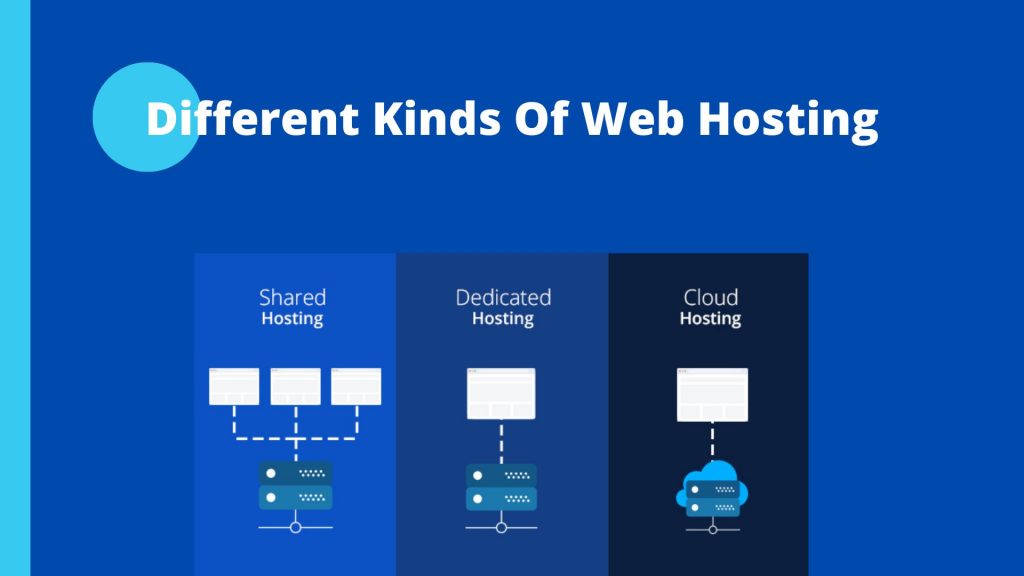In today’s world, having a website has become essential for any business to grow. Whether you are just starting your company or have a well-established organization, your website plays a critical role in shaping up the future of your business. This is one of the reasons why you should know about the different types of web hosting.
Each business has its unique requirement, and the web hosting companies are rushing to provide suitable solutions for all.
In this blog, we will introduce you to some of the most popular types of web hosting plans so that you can make an informed decision while choosing a hosting service for your website.

1. Shared Hosting
With a shared hosting plan, you host your website on a giant server with several other websites; this number can be in hundreds or possibly thousands. It’s like sharing an apartment with other roommates. You split the rent and have access to all the resources; however, you do not have control over them.
With a shared hosting plan, you share the resources such as RAM (Random Access Memory), CPU (Central Processing Unit), storage, and bandwidth with other websites hosted on the same server.
Sharing makes it more affordable for small businesses operating on a tight budget. It can be a perfect choice for an entry-level website with less traffic and simple applications.
2. Virtual Private Server Hosting
If your website’s requirement outgrows your shared hosting plan, the next step can be upgrading it to a VPS or Virtual Private Server hosting plan. With VPS hosting, you still share the physical server space, but your website gets a dedicated space allotted.
The hosting company splits the server into multiple independent virtual servers and allows you to host your website on the server space dedicated to your website. VPS hosting plans are more flexible in terms of customization and storage space options. In addition, you may also have access to the configuration of the server. With a VPS plan, you enjoy more security and enhanced performance.
3. Dedicated Server Hosting
Dedicated server hosting is pretty straightforward. You rent an exclusive server for hosting your website and retain total control over it. It is like having your own rented house where you do not share the resources with anyone else.
You can install the software and operating system of your choice and have the flexibility to configure the server. With a dedicated server plan, essentially, you are on your own. After acquiring the server, it is your job to install the required infrastructure to run and maintain the system. You need to build a well-equipped and secure server room with all the facilities. In addition, you will also need to employ a dedicated team of IT professionals to monitor the performance.
Dedicated web server hosting is the most advanced form of web hosting and requires a significant monetary investment. But, if your website attracts heavy traffic and uses complex applications, you do not have many options but to migrate to a dedicated server hosting plan.
4. Colocation
The term colocation refers to a service that came into being to mitigate the challenges of maintaining a dedicated server. With a colocation web hosting plan, you keep your server in a third-party data center. In this way, you get to enjoy all the facilities of having a dedicated server without having to worry about its security or day-to-day monitoring.
You rent a place in a colocation data center and store your server in their racks with several other servers. It’s their responsibility to build and maintain the infrastructure. In addition, it is their responsibility to keep the servers safe. This arrangement helps you save money and resources to a great extent.
Companies like Coloco offer a range of services in their colocation center. It is cost-effective, hassle-free, and secure.
5. Cloud hosting
Imagine cloud hosting to be a VPS hosting that uses cloud technology. That is to say, just as in the VPS hosting plan, you get a slice of the server, but instead of having it hosted on a single computer, you host it on a network of computers.
Cloud hosting reduces downtime by spreading over the resources on several computers. If one server malfunctions, the users are directed to other servers on the network. Another advantage of using a cloud hosting service is its easy scalability. With a cloud hosting plan, you can easily buy more space and traffic allotment as and when required.
While cloud-hosting can be an excellent option for massive internet-based companies, however smaller organizations with simple requirements might not see it as beneficial. The payment structure for cloud hosting can be a little tricky, and it requires a fair amount of knowledge and experience to navigate the process.
In conclusion, If you are in Washington DC or the Baltimore area and looking for a colocation facility, we are here to serve you.
Visit Coloco to know more about the different types of web hosting, our plans and choose the one that is suitable for your business.

